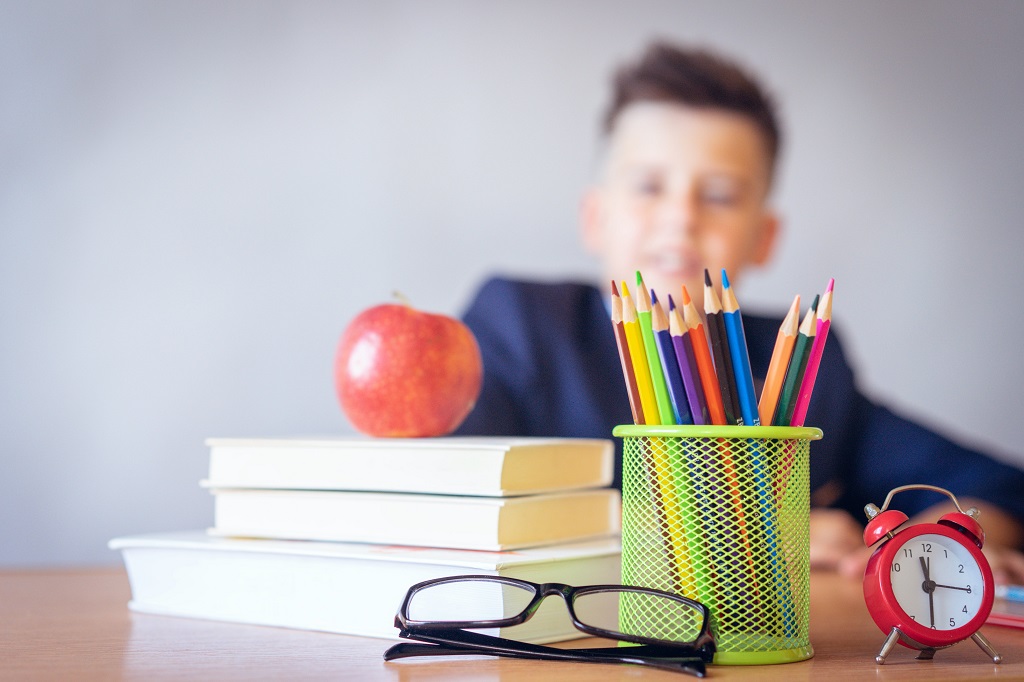

Starting school is an important milestone, but can also be a difficult and stressful time for children, and their parents or guardian. Children will spend the majority of their developmental period in school and is where they will have many impactful experiences, ones of success, failure, joy, despair, pride, and embarrassment. These experiences are completely out of the control of parents and guardians, which can be a difficult adjustment for them.
It is also completely normal for children to have school anxiety, since it is usually the first time spent separated from their parents in which they must cope with challenges independently, social and academic. If your child has previously spent time in day care, they may be more comfortable with the idea of daily separation, and therefore less anxious about the first days of kindergarten or preschool.
A child’s feelings about starting school are influenced by the preparation, feelings, and attitude of their parents or guardian. Generally, if a parent or guardian is anxious or has mixed feelings such as fear or guilt, about their child starting school, it can rub off on their child and add their reluctance. Therefore, it is of the utmost importance to prepare as a parent, so you can help your child prepare for starting school.
School Readiness
According to the National Education Association and the National Parent Teacher Association, it is never too early to begin preparing your child for starting school. “School readiness” is a term used to refer to academic and social readiness, the skills and knowledge required for children to excel in school. As a parent or guardian, you should be helping your child develop these skills before starting school.
Academic Readiness

Before the first day of kindergarten, children should have basic knowledge of the world around them, including themselves. You can begin to develop this knowledge by talking, playing, and reading with your child. The objective here is to build a foundation of knowledge and skills that teachers can build on all the way to elementary school. Below are some methods for academically preparing your child for school, focusing on subjects such as reading, writing, and math.
Reading and Writing
To help prepare your child for reading and writing, introduce them to language and begin to foster their listening and speaking skills.
- Sing rhyming songs and play rhyming games. For example, have your child name as many words as possible that rhyme with “cat.”
- Read to your child daily and discuss what you have just read.
- Take your child to the local library to check out books and attend storytimes.
- Sing the alphabet song with your child. Play with letter magnets or other toys that will help them learn the letters of the alphabet.
- Have your child practice writing letters, especially the letters in his or her name until they are able to write out their name. To make practicing letters more fun, have your child write in something like fingerpaint.
- If necessary, enroll your child in child care programs that encourage learning through fun and interesting activities.
Math
To help prepare your child for learning mathematical concepts, introduce them to patterns, shapes, and colors.
- Teach your child concepts like high, low, backward, forwards, under, and over.
- Play games or puzzles that require problem-solving and counting.
- Have your child learn basic colors by naming objects like “yellow school bus” or “red fire truck.”
- Draw, cut out, and paste basic shapes with your child.
- Count various objects or animals throughout the day.
- Make a game out of finding numbers on road signs, buildings, etc. Have your child name each one.
A Desire and Passion For Learning

A parent’s or guardian’s behavior will commonly rub off on their child, since children take cues from adults around them. If a parent is curious, their child will be curious. If a parent has a desire or passion for learning, so will their child. Encourage your child to learn, create, or share something new. Expressing pride in your child’s achievements will also give them the desire and confidence to learn more. To garner curiosity and motivation in your child, you can also:
- Demonstrate and maintain a positive attitude toward learning. Mention everything your child has to look forward to when they go to school.
- Introduce your child to new experiences regularly, including new places, games, or tasks. Talk about these experiences and have your child articulate what they liked or enjoyed.
- Take them to places like the grocery store, post office, pet shop, zoo, or the park. In fact, only one in five homes have a park located within a half-mile, and roughly the same number for recreation and fitness centers within the same distance.
- Regularly read new stories, eventually working up to longer chapter books. Read them one chapter a night and try to keep them interested and focused. Ask them questions and talk about past chapters to help them with comprehension and recall.
- Encourage your child to not give up. Encourage them to finish frustrating or difficult tasks.
- Teach your child to solve problems by considering positive outcomes. For example, have them start by asking, “What can I do to keep my brother from knocking over my favorite blocks?”
Social Readiness
Every child is starting school with a different level of social readiness, which is just as important as academic readiness. The term “social readiness” is a term generally used to refer to a child’s social skills in a school setting, including getting along with other children, following directions, and taking turns. This process usually starts with a child’s behavior. To improve your child’s behavior, you should:
- Set rules as well as consequences for breaking them.
- Establish a regular routine for waking up, mealtimes, playtimes, and bedtime.
- Show your child affection several times a day.
A certain level of social and emotional maturity is expected from children entering preschool or kindergarten, but these qualities can take some time and practice to learn. Below are some methods for socially preparing your child for school, focusing on concepts like communication, independence, and cooperation.
Communication
It is through communication that children can express what they know and understand about the world. To prepare your child for communicating his or her thoughts and feelings in school, you should:
- Hold regular conversations with your child. Reinforce the rules of conversation, such as listening first and then speaking.
- Encourage your child to converse with other adults and family members.
- Try to answer all your child’s questions.
- Teach your child new vocabulary and how to use new words.
- Use the language you would want your child to use themselves.
- Write letters to your child and help them write letters to family and friends.
Independence

For children, independence means completing simple tasks such as combing or brushing their hair, tying their shoes, or zipping up their coat, which can actually build confidence, increase self-esteem, and instill a sense of pride in your child. A certain level of independence will be expected from your child as they enter preschool or kindergarten.
- Allow your child to dress themselves and tie their own shoes by him or herself.
- Purchase clothes and shoes that your child can zip, fasten, or buckle on their own.
- Allow your child to complete simple chores like cleaning up toys, setting the table, or taking out the trash or recycling.
- Encourage your child to independently use the toilet and wash their hands.
- Encourage your child to independently complete previously mentioned activities such as completing puzzles.
- Give your child directions with three or more steps and give them the chance to complete them independently. For example, take a bath, put on your pajamas, brush your teeth, floss, choose a book to read, etc.
- Of course, it is okay to plan your child’s activities, but try not to be too domineering. Allow them to choose how they spend portions of their free time.
Cooperation
Qualities like cooperation require practice and time spent with other children at school to fully learn, but you can give your child the opportunity at home to begin developing qualities like cooperation.
- Encourage your child to play and cooperate with other children. Setting up playdates is a great idea, even better is your child can get to know their classmates prior to the first day.
- Teach your child the importance of sharing.
- Ask your child to consider the feelings of others. For example, when taking turns, ask your child how they would feel if someone else had a longer turn than them.
- Ask your child what they would do in various potential disputes or disagreements at school or on the playground. Discuss solutions for common problems.
- Discourage negative behaviors like yelling, hitting, or biting, and encourage other appropriate methods of expressing their feelings.
- Tell your child specific reasons when asking them to complete a task. Instead of “Because I said so,” try something like, “Put your toys away so no one trips and falls over them.”
Preparing for Starting School
There is a lot that needs to be done in the months and weeks leading up to the first day of preschool or kindergarten. It is best to remain calm and relaxed so your child is too.
Establishing a Routine
As previously mentioned, establishing a routine is important for continuity in your child’s life, which instills a sense of security. It is never too early to begin planning and establishing a routine. In the weeks leading up to your child’s first day, establish a regular routine for waking up for school and act out other parts of the day such as reading stories, playing outside, and nap time.
Visiting Your Child’s School
Before your child’s first day, visit their school together. Tour the school, including hallways, classrooms, cafeteria equipment, and playgrounds. If possible, meet with your child’s teacher. These types of visits will significantly increase your child’s confidence and comfort within this unfamiliar setting.
The Final Countdown

The last few weeks before starting school will sneak up on you and fly by. During this time, you will need to accomplish a few tasks and have specific checklists for the night before and the first day of school to avoid any last-minute forgetfulness.
Two Weeks Before The First Day
- Buy a backpack together for your child. If you can, let your child choose his or her own backup, reinforcing their independence.
- Label all your child’s items, including their backpack, coat, toys, etc., with their name and teacher’s name.
- Schedule an appointment with your child’s doctor or pediatrician.
- Contact the school’s nurse or health professional to provide any information about the medication they take on a daily basis. There are forms you must fill out for your child to take medication at school, from prescribed medications to calcium supplements.
- Schedule an appointment with an eye doctor for an eye exam. If this is their first visit, expect there to be more forms to be completed.
- Plan for your child’s transport to and from school, whether it be bus, parent, relative, or close friend.
- Have your child go to bed at the time they would on a normal school night about 2 weeks before school starts.
The Night Before The First Day
- Have your child pick out school, and weather, appropriate clothes for their first day.
- Answer any last-minute questions or soothe any last-minute concerns.
- Assure that your child goes to bed on time.
On The First Day
- Wake up early enough to avoid rushing.
- Prepare and sit down for breakfast with your child.
- Review the routine for the day, including transportation to and from school.
- Assist your child with packing their backpack, including any necessary supplies, such as pencils, crayons, markers, or other art supplies.
- If they are packing lunch, choose their favorite foods to help with familiarity on their first day. Leave a written note in their lunchbox to let them know you are thinking about them.
- If allowed, have your child choose a favorite stuffed animal, blanket, or book to take to school. This will also help with familiarity and make the transition to starting school easier.
If your child has difficulty handling the separation, consider staying with them in the classroom for a portion of the first day, if allowed by their teacher. You can stay to help set up school items, greet the teacher, and then say goodbye.



